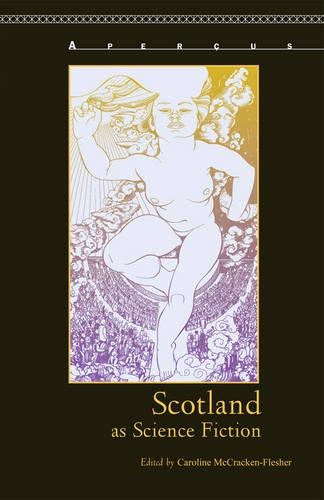
Scotland as Science Fiction
(Paperback)
Publishing Details
Scotland as Science Fiction
By (Author) Caroline McCracken-Flesher
Bucknell University Press
Bucknell University Press
27th October 2011
United States
Classifications
Professional and Scholarly
Non Fiction
Literary studies: poetry and poets
Literary studies: fiction, novelists and prose writers
Regional / International studies
823.08762099
Physical Properties
Paperback
208
Width 141mm, Height 219mm, Spine 12mm
277g
Description
Out of the mainstream but ahead of the tide, that is Scottish Science Fiction. Science Fiction emphasizes progress through technology, advanced mental states, or future times. How does Scotland, often considered a land of the past, lead in Science Fiction Left behind by international politics, Scots have cultivated alternate places and different times as sites of identity so that Scotland can seem a futuristic fiction itself.
This book explores the tensions between science and a particular society that produce an innovative science fiction. Essays consider Scottish thermodynamics, Celtic myth, the rigors of religious conversion, Scotlands fractured politics yet civil society, its languages of alterity (Scots, Gaelic, allegory, poetry), and the lure of the future. From Peter Pan and Dr. Jekyll to the poetry of Edwin Morgan and the worlds of Muriel Spark, Ken Macleod, or Iain M. Banks, Scotlands creative complex yields a literature that models the future for Science Fiction.
Reviews
Scottish writers' concern with fantastic otherworlds goes back to Celtic mythology. The Scottish philosophers of the 18th century and the scientists and inventors of the 19th century were worlds ahead of their time. Today this tiny country survives in the shadow of nuclear subs, Trident missiles, and nuclear reactors, all the stuff of contemporary science fiction. This interesting study, which was born out of an MLA conference, includes work by seven Scotland-based senior scholars and three Americans in addition to McCracken-Flesher (Univ. of Wyoming). Two of the top Scottish sci-fi authors (Iain M. Banks and Matthew Fitt) receive two chapters each; Robert Louis Stevenson, J. M. Barrie, Muriel Spark, Alasdair Gray, Naomi Mitchison, et al. are also treated. Edwin Morgan even managed to write Scottish poetry as sci fi in "A Home in Space." The problem with studying this speculative genre is how to reconcile science fiction with a regional culture and an obsolescent Scots language. This provocative study meets the challenge head-on. With a mixture of science and fantasy, myth and technology, the land of Dolly the cloned sheep has created a "brave new Scotland" in rewriting the genre of science fiction. Good bibliography and notes (devalued by tiny print). Summing Up: Recommended. Upper-division undergraduates, graduate students, researchers. * Choice Reviews *
Insightful and innovative from a Scottish-studies point of view.Many of the chapters offer lively commentary.a merit of this collection is that it will encourage such further conversation and connection. * Science Fiction Studies *
Author Bio
Caroline McCracken-Flesher is professor of English at the University of Wyoming. Her recent publications include Possible Scotlands: Walter Scott and the Story of Tomorrow (2005), The Doctor Dissected: A Cultural Autopsy of the Burke and Hare Murders (2011), and the edited Bucknell volume, Culture, Nation, and the New Scottish Parliament (2007).
